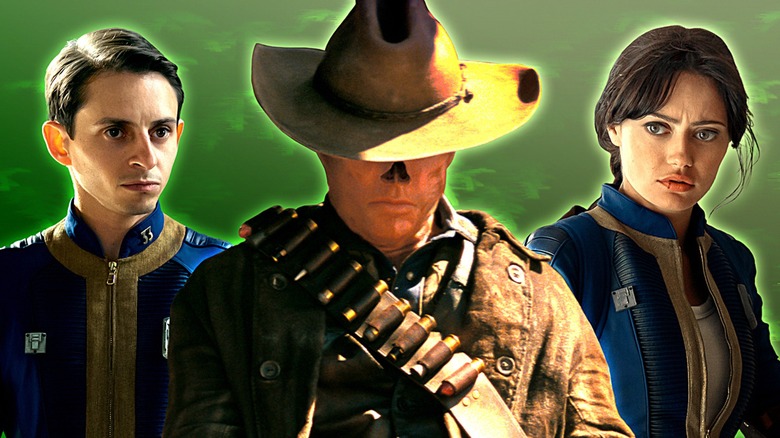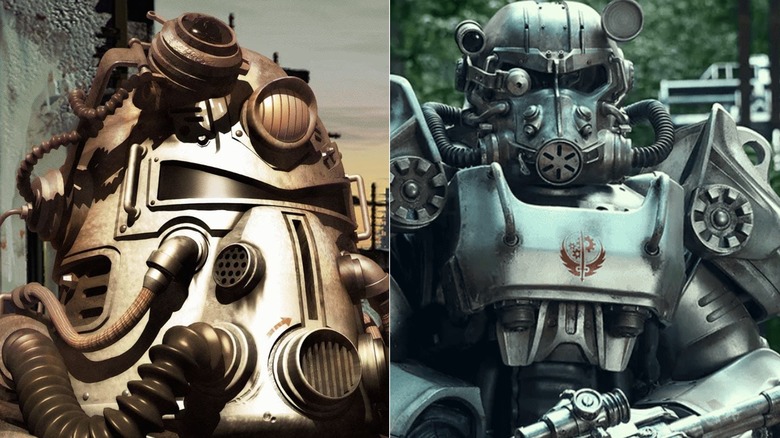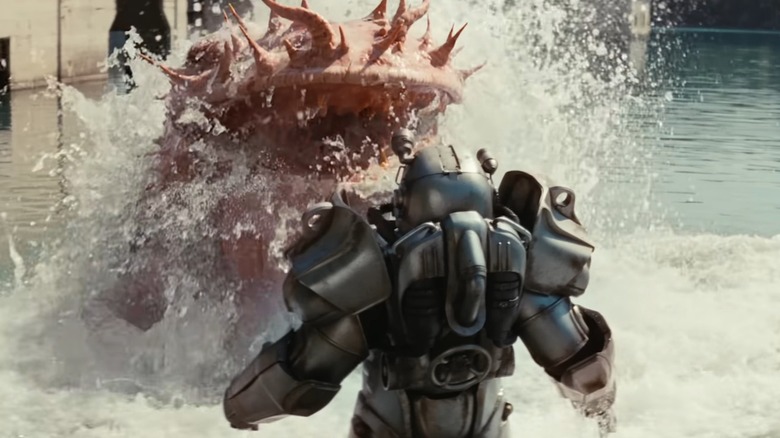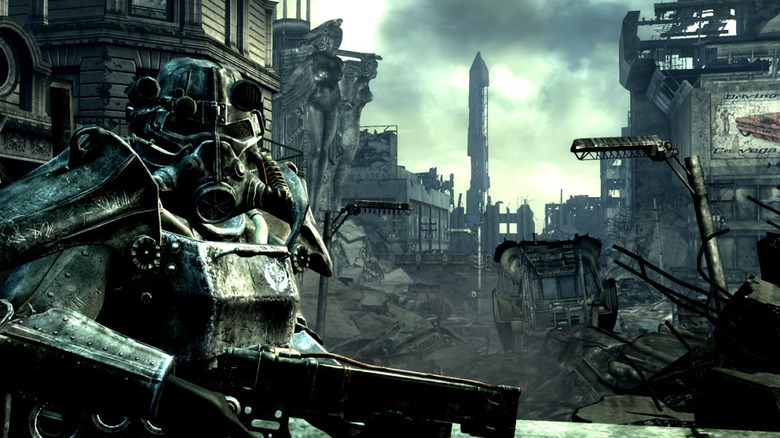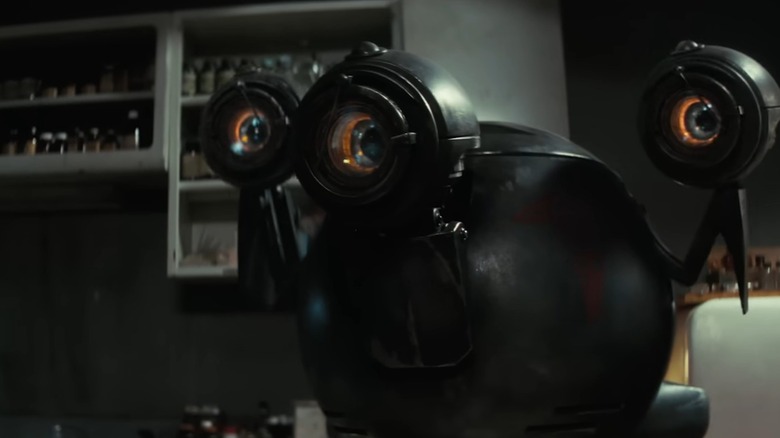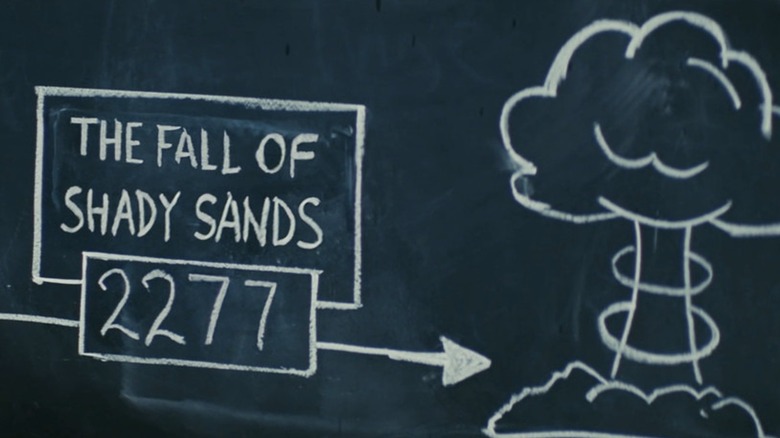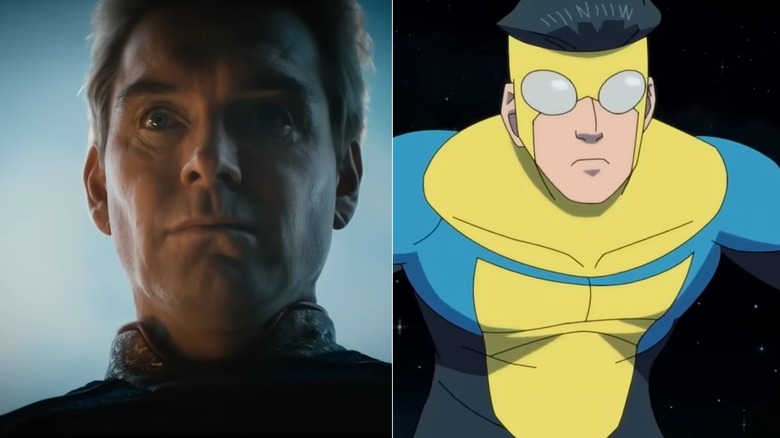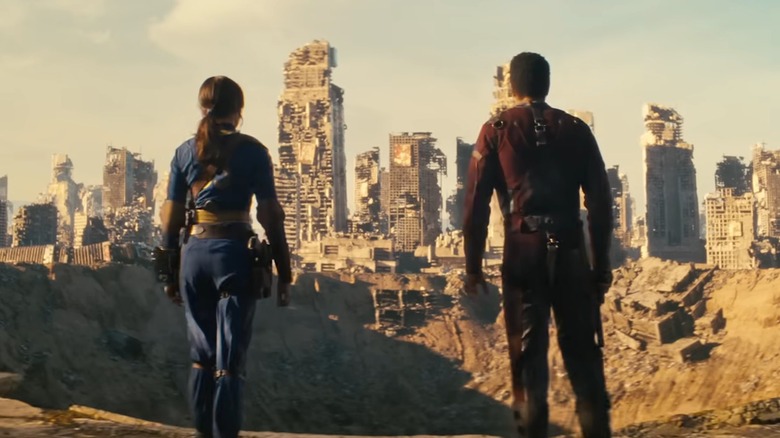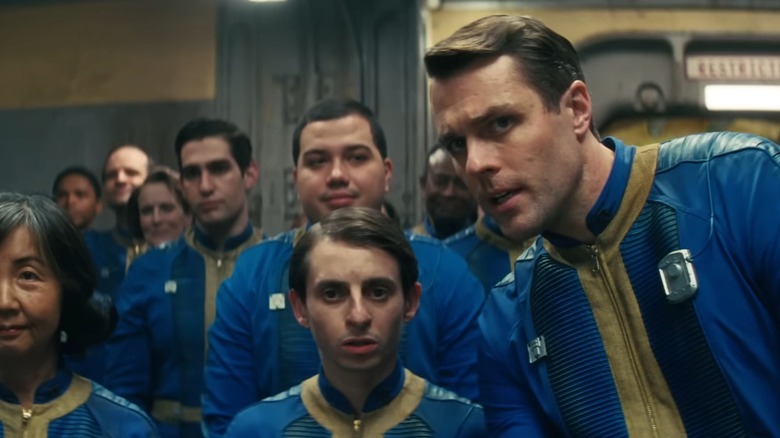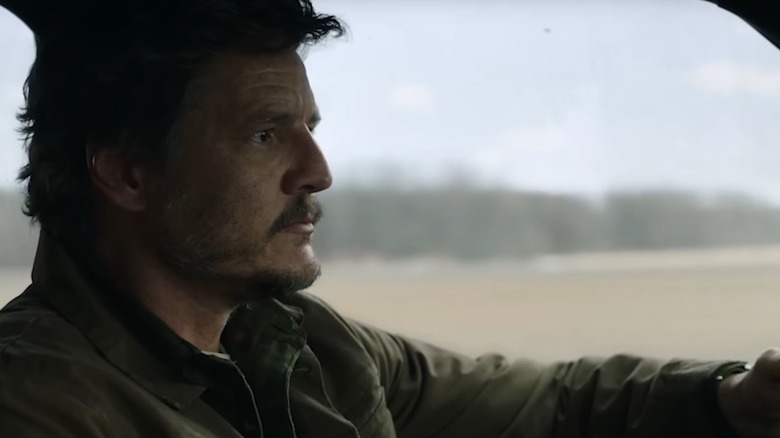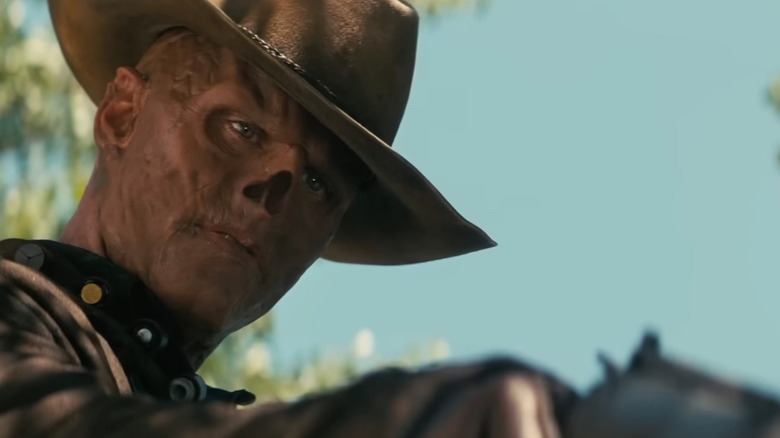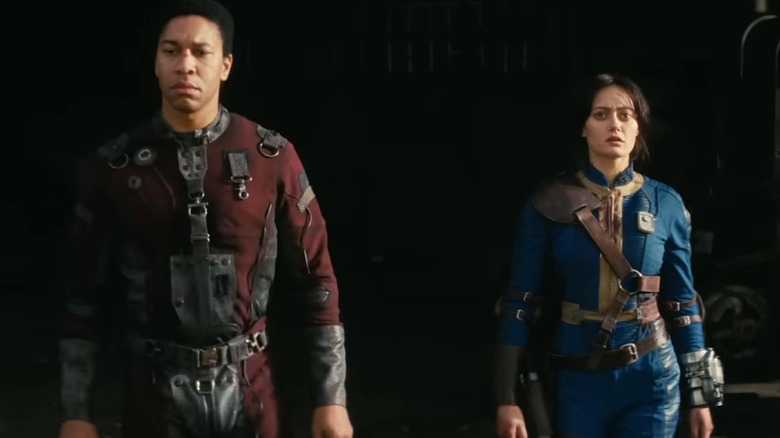Why Fallout Is Blowing Everyone Away
After much anticipation, the "Fallout" TV show is finally here, and critics on Rotten Tomatoes say it's well worth watching. While the show is packed with action set pieces, stunning props and sets, and characters that will endear themselves to just about any viewer, it's of course particularly aimed at people who love post-apocalyptic stories and anyone who's been playing all the "Fallout" games for years.
Not every reviewer has loved "Fallout," but most have been absolutely blown away by what the Prime Video series has accomplished. Today there are more good video game adaptations than ever before, but it's still impressive to see a beloved video game franchise so effortlessly brought into a new medium. "Fallout" is a perfect nuclear storm of entertainment, and without all the right pieces falling into place at the right time, it never would have worked. Much like the "Fallout" games themselves, the show is a product of hard work, passion, and a little luck. Let's look at why the final product is rewarding to engage with as a viewer and sure to have a hold on fans for years to come.
Fans have been waiting for it
The original "Fallout" game was developed by a company called Interplay and debuted in 1997. It introduced gamers to a wild post-apocalyptic wasteland, and every time a new iteration gets released, fans fall even more in love with the world of the game. Fans have been committed to the franchise for nearly 30 years, and there's no question that they've been imagining what a "Fallout" adaptation could possibly look like.
Some fans haven't been content to just speculate about what story an adaptation might tell, or if it would include all the "Fallout" staples like ghouls, super mutants, and deathclaws. Instead they've gone ahead and created their own adaptations. There have been quite a few different "Fallout" fan films and web projects. Some, like "Farewell New Vegas," use footage from the games to tell their stories, while others, like "Fallout: Revelation," are entirely live-action productions.
In the world of "Fallout" fan projects, there's one show that deserves special recognition. "Fallout: Nuka Break" is a two-season series that began in 2011. The show was initially a short film, but the wider "Fallout" fandom was so enthusiastic that it became an ongoing series. "Nuka Break" has all the creatures and props that fans want to see in a "Fallout" series, and it's all but guaranteed that anyone who enjoyed it back in the day will be tuning into Prime Video's adaptation.
It's a new kind of apocalypse
"Fallout" has had a bit of an uphill battle to attract new viewers beyond fans of the game, because there's been no shortage of post-apocalyptic stories for quite some time. Even before "The Walking Dead" dominated the airwaves, post-apocalyptic fiction was pretty popular, but since then we've been deluged with zombies, nukes, asteroids, climate change, and more. By now it seems like we've seen just about every possible way the world could end.
"Fallout" manages to breathe some fresh air into the genre, particularly for viewers who aren't well-acquainted with the franchise's history. The world of "Fallout" is more than just a post-apocalyptic wasteland. It's an alternate branch in our own history that imagines what the world would look like if the best and worst of the future that 1950s America envisioned came to pass. The atomic-punk aesthetic shows up in everything from building architecture to weapon designs, and it plays an integral role in the plot of the show, too.
Gamers have been in love with the fascinating world of "Fallout" for nearly 30 years, and the show brings it to life in a way that makes everything feel brand new. The show gets to borrow iconic imagery and bits of lore from the games to help flesh out a world that feels more lived-in and realistic than other, grittier apocalyptic series — even despite all the deviously friendly robots, armored zealots, and finger-mouthed lake monsters.
The games are only getting more popular
When the "Fallout" series began in the late 1990s, it had dedicated fans but was still relatively niche in the gaming world. The PC gaming market was smaller back then, and "Fallout" was a top-down intensive role-playing game that didn't necessarily attract a wide audience. Still, the franchise continued to grow with "Fallout 2," while "Fallout Tactics: Brotherhood of Steel" brought fans of strategy games to the franchise in 2001.
In the mid-2000s developer Bethesda Softworks was hard at work on "Fallout 3," which would reinvent the mechanics of the franchise. At the time, Bethesda decided to buy the rights to the entire franchise from Interplay for $5.75 million. Bethesda was well-established thanks to its popular "Elder Scrolls" series, and it saw a bright future for "Fallout." That investment has paid off way more than Bethesda probably thought it would nearly 20 years ago.
"Fallout 3," "Fallout 4," and "Fallout Shelter" are all among Bethesda's best-selling games of all time. "Fallout 3" and "Fallout 4" have each sold over 12 million copies, while "Fallout Shelter," which is free to play, has been downloaded more than 170 million times. Thanks in large part to Bethesda's support, and even before the release of the "Fallout" TV show, the franchise is more popular than ever.
It's loyal to the lore
The creators of "Fallout" have decided to walk a thin line when it comes to the show's relationship to the games, and it's massively paid off. Unlike the "Halo" TV series and its separate continuity, "Fallout" is set in the same universe as the video games, but unlike "The Last of Us," it doesn't try to adapt the storyline of any particular game. The plot is entirely original, and outside of a few cheeky references, no characters from the games appear in the show.
Video game fans are notoriously picky about their lore, and the "Fallout" show could very easily have made some serious mistake that left longtime fans bewildered and frustrated. Instead, for someone who's been playing the games for years, the show's attention to detail is breathtaking. Tiny background objects like household products and paintings are pulled directly from the games. The sound effects for things like Stimpaks, power armor, and even the Pip-Boy flashlight are completely accurate to what's come before.
Every team working on the show clearly cared deeply about doing right by the fans, and that benefits newcomers, too. "Fallout" stands out because it's so overloaded with details that you can watch the first season multiple times and still catch something new every episode.
It's not so loyal to the lore?
On the other hand, longtime "Fallout" fans aren't happy about everything the show's done. Prime Video's series is set in the year 2296, which is the latest point in the timeline that the franchise has ever explored. Because the show has pushed into new territory, it was bound to ruffle the feathers of some fans who've been experts on the "Fallout" history that's already been established.
The show establishes that a town called Shady Sands was destroyed, which immediately upset some fans. For one thing, Shady Sands was the capital city of the New California Republic — a faction within the games that fans have loved for decades. For another, a blackboard in the show seemed to indicate that Shady Sands was destroyed in 2277, which is four years before the events of "Fallout: New Vegas," a very NCR-heavy game that never mentions the destruction.
If you're a newcomer to the franchise, this controversy doesn't affect the show in the slightest. For diehard fans, though, this caused such a stir that Bethesda felt the need to clear the air. This is going to haunt "Fallout" subreddits for years to come — or at least until we get "Fallout" Season 2. The fact that people won't stop talking about it is actually keeping the show top of mind and giving it more time in the spotlight than the binge release model usually allows.
Prime Video's been building a solid catalog
It's worth noting that "Fallout" is definitely getting a boost because of the platform that's behind it. There are roughly 800 million streaming services these days, but at least in terms of subscriber count, they don't all come equal. Amazon Prime Video has over 200 million subscribers, which makes it the second largest streamer in the business. Only a portion of a subscriber base is going to watch any given show, so Prime Video series have a huge advantage just based on the number of eyeballs that see them on the home page when they sign into their smart TV.
Prime Video has also had a string of successes lately whose viewers probably have some overlap with the "Fallout" fandom. Shows like "The Boys," "Gen V," and "Invincible" might be focused on superheroes in a modern-day world, but the mix of sci-fi, action, and gore that appears in all those shows is also a key ingredient in what makes "Fallout" work. Prime Video is becoming known more and more as a platform that creates genre entertainment, so when it puts out a show like "Fallout," even people who aren't familiar with the franchise are going to be predisposed to checking it out.
The marketing's been everywhere
A show like "Fallout" isn't designed to just attract a small number of Prime Video subscribers. It's supposed to bring new people to the platform, and it's clear that Amazon really believed in this show's potential to do just that. Amazon gave "Fallout" a jaw-dropping budget of $153 million, which puts it in league with the most expensive TV productions of all time. The budget shines through in the on-location sets and practical effects that get displayed throughout Season 1, but Amazon's money also helped push "Fallout" marketing everywhere before the series premiere.
Amazon plastered "Fallout" all over Prime Video, with multiple trailers building the hype for the series. The company wasn't alone in its efforts: Bethesda also helped create behind-the-scenes featurettes, with director Todd Howard doing interviews to talk about the show's accurate connection to the games. Then there's the merch. The "Fallout" franchise has always been ripe for swag, but Bethesda's latest Pip-Boy replica and Amazon's roundup of show-related merch really help keep people engaged with the series even when they aren't watching it or playing the games.
The show has some serious talent behind it
Great marketing, a giant budget, and an established fanbase will only get a show so far. No matter how favorable the conditions are, a show isn't going to succeed unless it can stand on its own two feet. Luckily for "Fallout," there's a wealth of talent on display both in front of the camera and behind the scenes.
Some of the bigger names attached to the show undoubtedly brought in viewers that had never heard of "Fallout" before, and the fact that they gave the show their all definitely locked in new fans. Jonathan Nolan is an executive producer for the series, and the mastery he showed on "Westworld" Season 1 is back on the screen here. Series creators Geneva Robertson (writer for "Captain Marvel" and 2019's "Tomb Raider") and Graham Wagner ("Silicon Valley" and "Portlandia") bring all the know-how necessary to balance the show's competing tones.
Ella Purnell, Walton Goggins, and Aaron Moten are each successful in their own right, and they make the main characters in "Fallout" complicated, awkwardly hilarious, and easy to root for. Goggins in a dual role as Cooper Howard and The Ghoul is especially notable, and he steals every scene that he's in. The supporting actors like Moises Arias, Dave Register, Annabel O'Hagan, and Leslie Uggams are also stellar and turn what could be forgettable B-plots into some of the most memorable storylines of the entire season.
Now is a good time for video game adaptations
For a long time, the only video game adaptations were things like 1993's "Super Mario Bros." or 2005's "Doom." They barely stuck to their source material and didn't have many other redeeming qualities of their own. Compared to those days, the 2020s are a utopia for video game fans itching to put down the controller and watch something at home.
Not only have we gotten a redemptive "Mario Bros." movie, but we've also been showered with TV adaptations that range from acceptable to award-winning. Shows like "Halo" take their source material as a mere suggestion, but balance that out with great-looking effects and action. Something like "Twisted Metal" ups the action even more and demonstrates that a video game show can be just entertaining enough without taking itself too seriously.
Then there's the elephant in the room. HBO's "The Last of Us" set a new standard for video game adaptations, and that's something "Fallout" executive producer Jonathan Nolan is well aware of. Nolan told The Hollywood Reporter that when he first started working on "Fallout," no one had any idea if a video game show could be good. Now that's changed, he says: "When somebody makes something as good as 'The Last of Us' it makes it easier, because suddenly everyone understands what's possible." In some ways "Fallout" gets to capitalize on the success of "The Last of Us" because general viewers finally believe video game adaptations can work.
The show hits more than one note
"Fallout" has something for everyone — except maybe kids. It's a post-apocalyptic show for adults, but there are plenty of scenes that don't line up with the image that description summons up. "Fallout" is frequently dramatic and consistently gory, but just when you think you know what the show is, it becomes satirical, slapstick-y, or downright silly. Then when you're busy laughing or considering the implications of end state capitalism, someone's head explodes, and you're back in a gritty life-or-death situation.
This is something gamers have already gotten used to. The "Fallout" games have remained so successful and popular because they aren't afraid to mix tones and tell a wide variety of stories. In the games you'll go from a terrifying chase with a deathclaw to delivering a violin to a tearful elderly woman, then the next day you'll stumble into the headquarters of a cult that worships a talking tree.
Jonathan Nolan told The Hollywood Reporter that when he first played "Fallout 3," it was that variety that surprised him most. "[It was] the sense of humor and irony and the cutting level of satire and this depiction of an Eisenhower-era America that never lost its swagger and kept lumbering forward," he said, adding, "it just had a unique tone." The show has managed to perfectly translate all the different notes that the games hit. Individual episodes flip back and forth from comedy to drama to horror, making every scene incredibly engaging.
It's only the beginning
For an Amazon Prime Video show, "Fallout" has an interesting release strategy. Some of the streamer's biggest shows, like "The Boys" and "Invincible," have been released week to week, but Prime Video chose the binge model for "Fallout." In some cases a binge release can mean viewers burn through all the material in one go and promptly forget about the series until a new season is released, but here "Fallout" has another thing going for it. The show is just the beginning.
Anyone who becomes interested in "Fallout" after watching Season 1 doesn't have to wait years before getting more immersed in the story. There are a ton of "Fallout" games that they can dive into immediately, and that's exactly what seems to be happening. After the show's release, the Bethesda "Fallout" games — that's "Fallout 3," "Fallout 4," and "Fallout 76" – have more than tripled their concurrent player counts on Steam. People are enthusiastic about the series after Season 1, and the games are going to help keep that enthusiasm alive until Season 2 arrives. On top of that, because the show and the games are so intertwined, viewers can use their experience in the games to theorize about what might happen in the wasteland when Prime Video's show returns.
